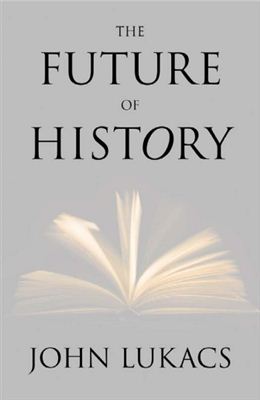Publisher: Yale University Press. 2011. ISBN-10:
0300169566. ISBN-13: 978-
0300169560. (190 pages).
Contents : Historianship - Problems for the Profession - The Appetite for History - Re-Cognition of History as Literature - History and the Novel - Future of the Profession - Tradition, Inheritance, Imagination.
Product Description.
For more than sixty years, John Lukacs has been writing, teaching, and reading about the past. In this inspired volume, he tus his attention to the future. Throughout The Future of History, Lukacs reflects on his discipline, eloquently arguing that the writing and teaching of history are literary rather than scientific, comprising knowledge that is neither wholly objective nor subjective. History at its best, he contends, is personal and participatory.
Despite a recently unprecedented appetite for history among the general public, as evidenced by history television program ratings, sales of popular history books, and increased participation in local historical societies, Lukacs believes that the historical profession is in a state of disarray. He traces a decline in history teaching throughout higher education, matched by a corresponding reduction in the number of history students. He reviews a series of short-lived fads within the profession that have weakened the fundamentals of the field. In looking for a way forward, Lukacs explores the critical relationships between history and literature, including ways in which novelists have contributed to historical understanding. Through this startling and enlightening work, readers will understand Lukacs's assertion that "everything has its history, including history" and that history itself has a future, since everything we know comes from the past.
0300169566. ISBN-13: 978-
0300169560. (190 pages).
Contents : Historianship - Problems for the Profession - The Appetite for History - Re-Cognition of History as Literature - History and the Novel - Future of the Profession - Tradition, Inheritance, Imagination.
Product Description.
For more than sixty years, John Lukacs has been writing, teaching, and reading about the past. In this inspired volume, he tus his attention to the future. Throughout The Future of History, Lukacs reflects on his discipline, eloquently arguing that the writing and teaching of history are literary rather than scientific, comprising knowledge that is neither wholly objective nor subjective. History at its best, he contends, is personal and participatory.
Despite a recently unprecedented appetite for history among the general public, as evidenced by history television program ratings, sales of popular history books, and increased participation in local historical societies, Lukacs believes that the historical profession is in a state of disarray. He traces a decline in history teaching throughout higher education, matched by a corresponding reduction in the number of history students. He reviews a series of short-lived fads within the profession that have weakened the fundamentals of the field. In looking for a way forward, Lukacs explores the critical relationships between history and literature, including ways in which novelists have contributed to historical understanding. Through this startling and enlightening work, readers will understand Lukacs's assertion that "everything has its history, including history" and that history itself has a future, since everything we know comes from the past.

